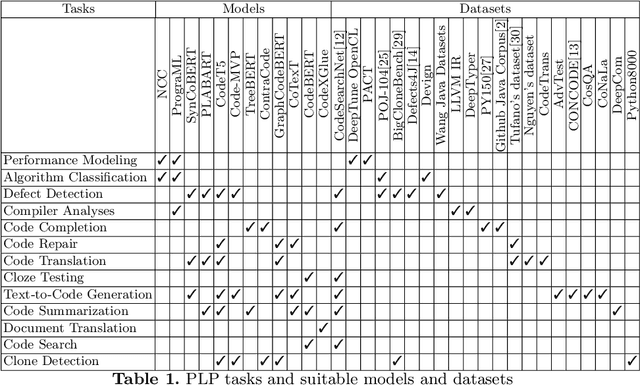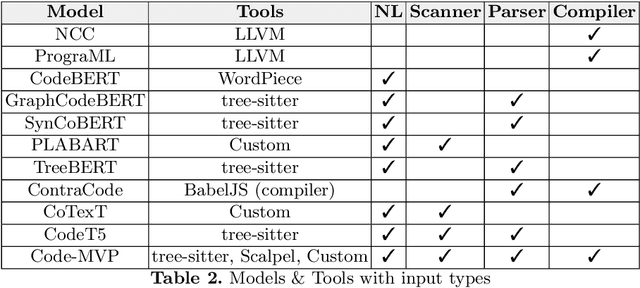Pei-Hung Lin
Fortran2CPP: Automating Fortran-to-C++ Migration using LLMs via Multi-Turn Dialogue and Dual-Agent Integration
Dec 27, 2024



Abstract:Migrating Fortran code to C++ is a common task for many scientific computing teams, driven by the need to leverage modern programming paradigms, enhance cross-platform compatibility, and improve maintainability. Automating this translation process using large language models (LLMs) has shown promise, but the lack of high-quality, specialized datasets has hindered their effectiveness. In this paper, we address this challenge by introducing a novel multi-turn dialogue dataset, Fortran2CPP, specifically designed for Fortran-to-C++ code migration. Our dataset, significantly larger than existing alternatives, is generated using a unique LLM-driven, dual-agent pipeline incorporating iterative compilation, execution, and code repair to ensure high quality and functional correctness. To demonstrate the effectiveness of our dataset, we fine-tuned several open-weight LLMs on Fortran2CPP and evaluated their performance on two independent benchmarks. Fine-tuning on our dataset led to remarkable gains, with models achieving up to a 3.31x increase in CodeBLEU score and a 92\% improvement in compilation success rate. This highlights the dataset's ability to enhance both the syntactic accuracy and compilability of the translated C++ code. Our dataset and model have been open-sourced and are available on our public GitHub repository\footnote{\url{https://github.com/HPC-Fortran2CPP/Fortran2Cpp}}.
Towards Zero Memory Footprint Spiking Neural Network Training
Aug 16, 2023



Abstract:Biologically-inspired Spiking Neural Networks (SNNs), processing information using discrete-time events known as spikes rather than continuous values, have garnered significant attention due to their hardware-friendly and energy-efficient characteristics. However, the training of SNNs necessitates a considerably large memory footprint, given the additional storage requirements for spikes or events, leading to a complex structure and dynamic setup. In this paper, to address memory constraint in SNN training, we introduce an innovative framework, characterized by a remarkably low memory footprint. We \textbf{(i)} design a reversible SNN node that retains a high level of accuracy. Our design is able to achieve a $\mathbf{58.65\times}$ reduction in memory usage compared to the current SNN node. We \textbf{(ii)} propose a unique algorithm to streamline the backpropagation process of our reversible SNN node. This significantly trims the backward Floating Point Operations Per Second (FLOPs), thereby accelerating the training process in comparison to current reversible layer backpropagation method. By using our algorithm, the training time is able to be curtailed by $\mathbf{23.8\%}$ relative to existing reversible layer architectures.
Creating a Dataset for High-Performance Computing Code Translation: A Bridge Between HPC Fortran and C++
Jul 28, 2023



Abstract:In this study, we present a novel dataset for training machine learning models translating between OpenMP Fortran and C++ code. To ensure reliability and applicability, the dataset is initially refined using a meticulous code similarity test. The effectiveness of our dataset is assessed using both quantitative (CodeBLEU) and qualitative (human evaluation) methods. We demonstrate how this dataset can significantly improve the translation capabilities of large-scale language models, with improvements of $\mathbf{\times 5.1}$ for models with no prior coding knowledge and $\mathbf{\times 9.9}$ for models with some coding familiarity. Our work highlights the potential of this dataset to advance the field of code translation for high-performance computing. The dataset is available at https://github.com/bin123apple/Fortran-CPP-HPC-code-translation-dataset
LM4HPC: Towards Effective Language Model Application in High-Performance Computing
Jun 26, 2023Abstract:In recent years, language models (LMs), such as GPT-4, have been widely used in multiple domains, including natural language processing, visualization, and so on. However, applying them for analyzing and optimizing high-performance computing (HPC) software is still challenging due to the lack of HPC-specific support. In this paper, we design the LM4HPC framework to facilitate the research and development of HPC software analyses and optimizations using LMs. Tailored for supporting HPC datasets, AI models, and pipelines, our framework is built on top of a range of components from different levels of the machine learning software stack, with Hugging Face-compatible APIs. Using three representative tasks, we evaluated the prototype of our framework. The results show that LM4HPC can help users quickly evaluate a set of state-of-the-art models and generate insightful leaderboards.
Structured Thoughts Automaton: First Formalized Execution Model for Auto-Regressive Language Models
Jun 16, 2023Abstract:In recent months, Language Models (LMs) have become a part of daily discourse, with focus on OpenAI and the potential of Artificial General Intelligence (AGI). Furthermore, the leaking of LLama's weights to the public has led to an influx of innovations demonstrating the impressive capabilities of generative LMs. While we believe that AGI is still a distant goal, we recognize the potential of LMs in solving tasks such as searching complex documents, compiling reports with basic analysis, and providing assistance in problem-solving. In this paper, we propose formalizing the execution model of language models. We investigate current execution models, to find that this formalism has received little attention, and present our contribution: the first formalized execution model for LMs. We introduce a new algorithm for sampling the predictions of LMs, which we use to build a reliable and inspectable execution model. We introduce a low-level language to write "cognitive program" for this execution model. We hope to shed light on the need for execution models for LMs and encourage further research in this area.
Making Machine Learning Datasets and Models FAIR for HPC: A Methodology and Case Study
Nov 03, 2022



Abstract:The FAIR Guiding Principles aim to improve the findability, accessibility, interoperability, and reusability of digital content by making them both human and machine actionable. However, these principles have not yet been broadly adopted in the domain of machine learning-based program analyses and optimizations for High-Performance Computing (HPC). In this paper, we design a methodology to make HPC datasets and machine learning models FAIR after investigating existing FAIRness assessment and improvement techniques. Our methodology includes a comprehensive, quantitative assessment for elected data, followed by concrete, actionable suggestions to improve FAIRness with respect to common issues related to persistent identifiers, rich metadata descriptions, license and provenance information. Moreover, we select a representative training dataset to evaluate our methodology. The experiment shows the methodology can effectively improve the dataset and model's FAIRness from an initial score of 19.1% to the final score of 83.0%.
Finding Reusable Machine Learning Components to Build Programming Language Processing Pipelines
Aug 11, 2022



Abstract:Programming Language Processing (PLP) using machine learning has made vast improvements in the past few years. Increasingly more people are interested in exploring this promising field. However, it is challenging for new researchers and developers to find the right components to construct their own machine learning pipelines, given the diverse PLP tasks to be solved, the large number of datasets and models being released, and the set of complex compilers or tools involved. To improve the findability, accessibility, interoperability and reusability (FAIRness) of machine learning components, we collect and analyze a set of representative papers in the domain of machine learning-based PLP. We then identify and characterize key concepts including PLP tasks, model architectures and supportive tools. Finally, we show some example use cases of leveraging the reusable components to construct machine learning pipelines to solve a set of PLP tasks.
 Add to Chrome
Add to Chrome Add to Firefox
Add to Firefox Add to Edge
Add to Edge